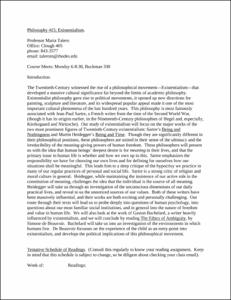Please use this identifier to cite or link to this item:
http://hdl.handle.net/10267/1198Full metadata record
| DC Field | Value | Language |
|---|---|---|
| dc.contributor.author | Talero, Maria L. | - |
| dc.date.accessioned | 2008-02-25T17:04:23Z | - |
| dc.date.available | 2008-02-25T17:04:23Z | - |
| dc.date.issued | 2008-02-25T17:04:23Z | - |
| dc.identifier.uri | http://hdl.handle.net/10267/1198 | - |
| dc.description | This syllabus was submitted to the Rhodes College Office of Academic Affairs by the course instructor. | en_US |
| dc.description.abstract | We will also look at the work of Gaston Bachelard, a writer heavily influenced by existentialism, and we will conclude by reading The Ethics of Ambiguity, by Simone de Beauvoir. Bachelard will take us into an investigation of the environments in which humans live. De Beauvoir focusses on the experience of the child as an entry-point into existentialism, and develops the political implications of this philosophical movement. | en_US |
| dc.language.iso | en_US | en_US |
| dc.publisher | Memphis, Tenn. : Rhodes College | en_US |
| dc.relation.ispartofseries | Syllabi CRN | en_US |
| dc.rights | Rhodes College owns the rights to the archival digital images in this repository. Images are made available for educational use only and may not be used for any non-educational or commercial purpose. Approved educational uses include private research and scholarship, teaching, and student projects. For additional information please contact archives@rhodes.edu. Fees may apply. | - |
| dc.subject | Philosophy, Department of | en_US |
| dc.subject | Syllabus | en_US |
| dc.subject | Curriculum | en_US |
| dc.subject | Academic departments | en_US |
| dc.subject | Text | en_US |
| dc.subject | 2004 Fall | en_US |
| dc.title | PHIL 415-01, Existentialism, Fall 2004 | en_US |
| dc.type | Syllabus | en_US |
| Appears in Collections: | Course Syllabi | |
Files in This Item:
| File | Description | Size | Format | |
|---|---|---|---|---|
| 2004_fall_PHIL_415-01.pdf | 36.25 kB | Adobe PDF |  View/Open |
Items in DSpace are protected by copyright, with all rights reserved, unless otherwise indicated.